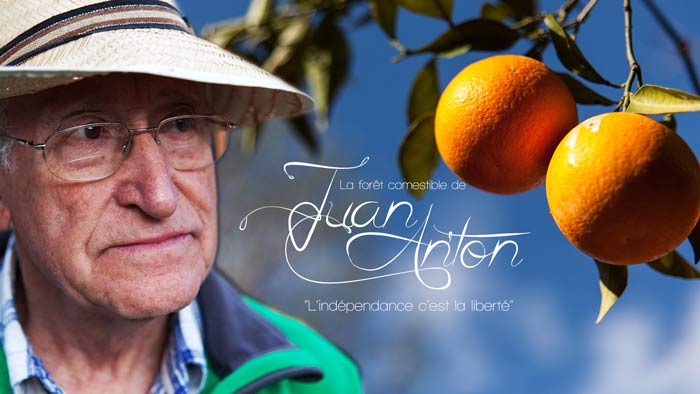
You are currently on the light version of the episode. The interactive version, much more beautiful, is here - available only from a computer.
VIDEO
English subtitles are available, click on CC...
MAGAZINE
Juan Anton's Edible Forest
« We depend on stores to get food, so we depend on money, and as a consequence we depend on a paid work or social aids given by the State.
However today, unemployment is increasing and more and more people struggle to find a job. So, how can you eat if you can’t rely on social aids?
Everyone needs to eat, and as food comes from the ground, let’s grow our own food ourselves! »
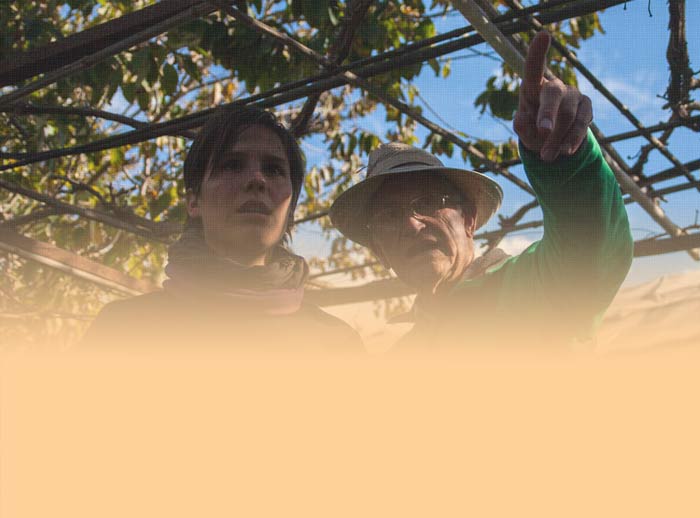
Juan Anton Mara, 78 years old, goes for a 40-minute run several times a week. He organizes meetings that last several days at his home with dozens of people. “Everyone brings their own sleeping bag, and we figure things out” he says.
There’s no need to say that Juan Anton is in stunning shape! What is his secret? A healthy lifestyle and his desire to change the world must have played their part.
The purpose of each of his actions is indeed to « change the world », or to be more precise, to fight hunger in the world. No less.
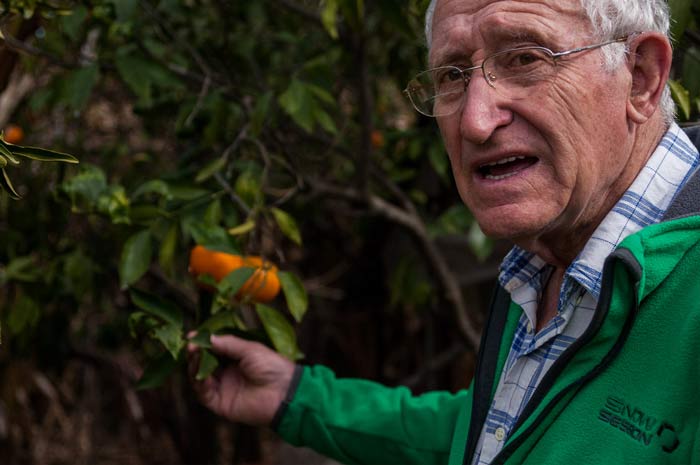
« Society should be based on two cornerstones: « work » (the contribution of one’s skills to society), and food production. This way, no matter what happens, if one loses their job, they will always have something to eat. »
« As long as we depend on a paid job, our safety will be hanging by a thread. »
These are not just words. Juan Anton puts the theory into practice in his own life and even goes further: he experiments withevery possible ways to make farming easier.
Being self-sufficient for food is not only safe, itis also a way to get some kind of freedom in a society where ther is no choice anymore (ever).
« You have to call a spade a spade!
When you’re in a bakery and the baker can’t tell where his flour comes from, when the market is under the control of the GM industry, and when you can’t choose the products you want to buy, it is a dictatorship.
When the people you vote for spend their time lying and acting contrary to their words, it is a dictatorship.
We have to find a way to do things ourselves. We have to learn how to grow and produce healthy food, and how to sell or exchange it ourselves. »
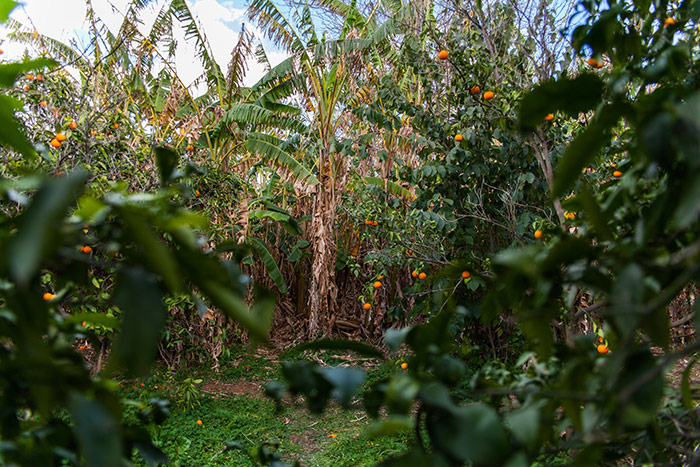
1. An edible forest to feed people easily
It all started 30 years ago. Juan Anton was looking for a peaceful place to build a vegetable garden and raise chickens. He bought a small plot with orange trees. Before he retired, he was following the advice of the gardener in charge of the stand in a conventional way… until the day when he suggested him to use a herbicide that would kill the grass for 8 years. Juan Anton had an epiphany. Not knowing exactly where this would all go, Juan Anton decided to stop using chemicals. The gardener quit. A few months later, it’s a disaster. The grass is growing and the trees are dying of starvation.
« I started to get interested in soil science. I took ecological farming classes and a permaculture class and I bought some of Fukuoka’s books. Then I started to apply what I was learning. »
He started to put grass at the base of the trees so that it turns into compost. It took a few months for the trees to grow again, the timefor the microorganisms killed by pesticides to come back and do their job again.
Step by step, Juan Anton plants new trees: banana trees, walnut trees, almond trees, fig trees, olive trees, peach trees, and many others. He starts to create his edible forest following permaculture rules. The goal is to have the best productivity with minimal effort. And it works.
« Today, the hardest part of the job is to harvest. When the leaves fall, microorganisms eat them and turn them into tree food. It’s as simple as that. It’s natural and there is nothing to add. »
Juan Anton’s forest proves it: the trees are healthy and the fruits are delicious. Some simple principles explain this success, for instance about orange trees diseases:
« These orange trees are healthy only because the ground is healthy and because the diseases somehow prefer the trees from the neighboring fields. Chemical fertilizers make the sap sweet, which increases the risk of disease. Here, the ground makes the sap bitter, so the diseases stay away from it! »
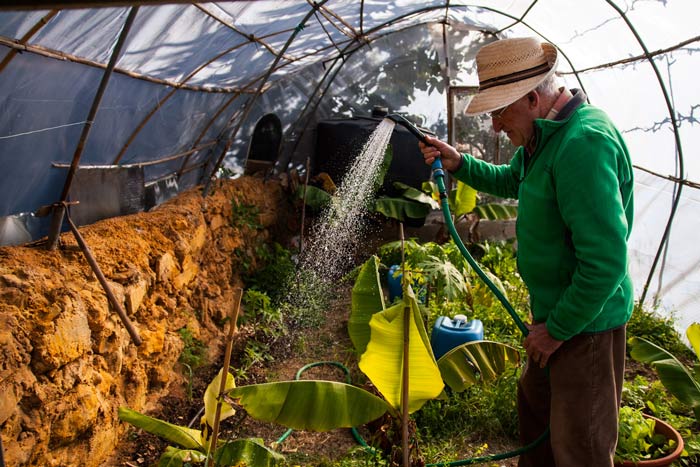
Today, Juan Anton’s goal is to find an easy way to produce vegetables all year long. He builds homemade greenhouses with local material or furniture, like bamboo, an old fridge, fallen tree branches. His creativity has no limit!
One of his most interesting experiments is the wall inside the main greenhouse that he built with stones picked up in the forest. He uses it to store the heat during the day and give it back during the night so that the plants don't freeze in winter.
« By producing fruits, the edible forest protects us from starvation. It would be interesting to supplement it with annual plants such as vegetables, cereals, and aromatic herbs. This is not restricted to people who have a garden: you can fit pot plants everywhere! »
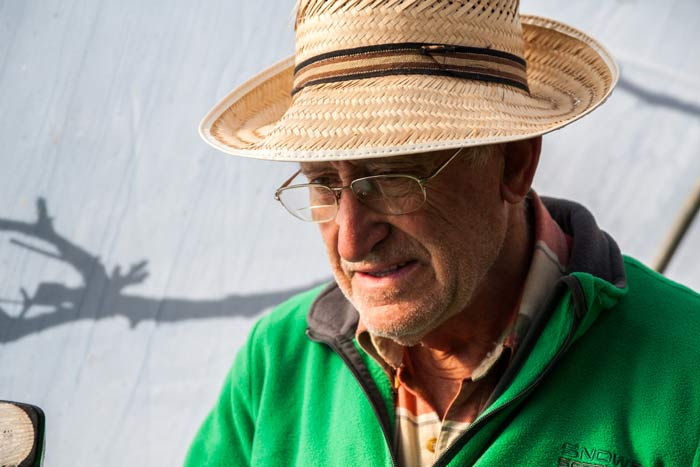
2. Taking action to get our freedom back
According to Juan Anton, anyone can create an edible forest. All you need is a small surface. You have to choose trees adapted to the climate, those that grow around naturally and enable nature to work on its own, without the help of the human hand.
« All in all, this does not require an extensive knowledge of plants; all you need is the will to do it. »
And to facilitate the implementation by others, he tries out and offers everyone to come and enjoy the result of his work. Everyone is welcome to visit his edible forest and learn from it.
The forest is like a book which does not use letters but another kind of language. You only need to look at it to understand and remember it forever. Coming to see the forest is far more instructive than any other speaking words.
Dependence is slavery!
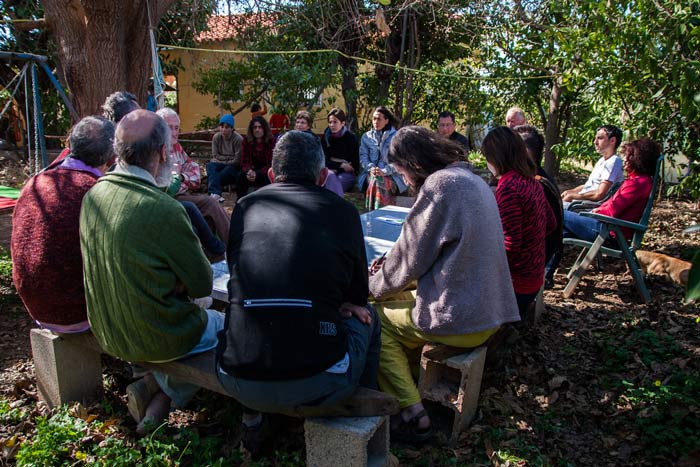
Juan Anton also organizes meetings with people interested in food self-sufficiency or more generally speaking, anyone wishing to emancipate themselves from what our society imposes.
The goal is to share knowledge. Besides, meetings will soon widen to all kinds of homesteading skills: learning how to plant, how to make oil, bread, marmalade and soap, all simple things yet necessary to our independence.
Beyond that, Juan Anton considers basic agriculture knowledge should be part of academic programs. Indeed, everyone should be able to plant trees and plants in order to meet their basic needs.
« The idea isn’t for us to become all farmers, but only to get enough knowledge (like learning how to drive for example), in order not to ask others to feed us, not to have to beg in the streets and wait for someone to give you something. »
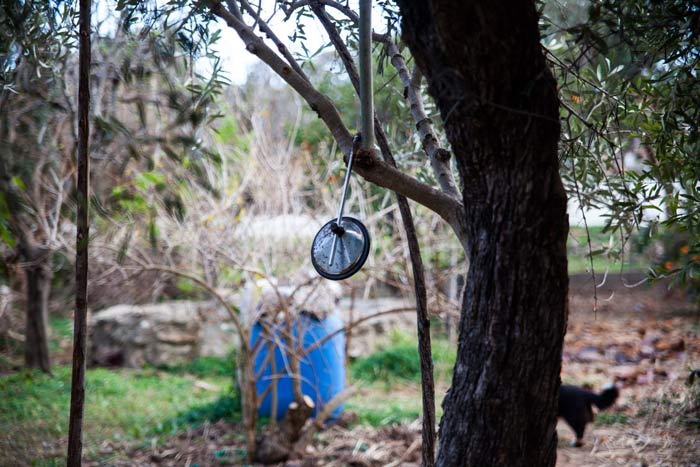
Juan Anton is also thinking about techniques for people who live in the cities. It is already possible to grow vegetables in trays, but he wants to go further by establishing more sustainable actions. He started the idea of growing fruit trees wherever a piece of land is available, without asking anything to anyone.
« Trees, after being planted, have a longer lifespan than any human being. If we let nature take its course, trees do not need human intervention in order to produce a high quantity of food. »
This is the beginning of a movement, and knowing Juan Anton, we can already tell that it won’t remain just an idea. According to him, the issue of food is in between our hands. It's all about taking action.
« As long as humans are in need of food to survive and don’t have the means to get it, streets, parks, and public spaces which are not filled with fruit trees will remain an offense to all those who don’t have the means to live! »
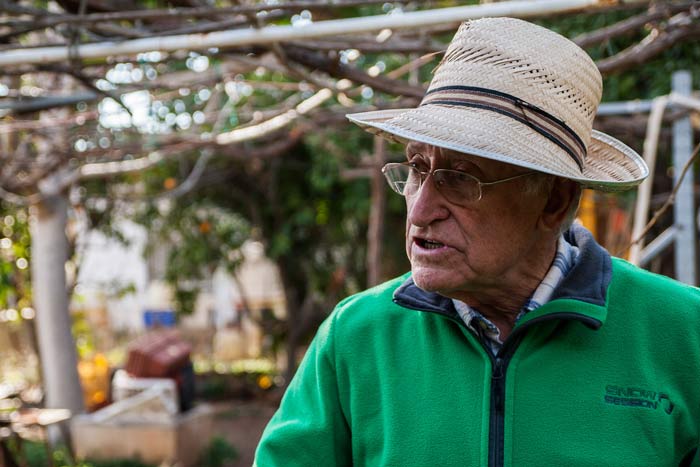
3. Some information to take action near you
Become in charge of your own food production: a number of movements and actions have appeared in the past few years.
Shared gardens or community gardens
Their purpose is to offer people living in the same neighborhood the possibility to cultivate together a piece of land that they share. This also enables people from a same area to meet up and form bonds. You can find the list of shared gardens near you by contacting the network of the shared gardens: jardins-partages.org
The incredible edible
This movement has developed a lot in the past two years within cities in order to boost plantations wherever a piece of green space is available (at the foot of trees, grass land, etc.), as well as in trays. In brief, free food produced within cities and available to anyone. In order to join the movement of your own city, please check:
incredible-edible.info
Guerilla gardening
In the same way, the green guerilla proposes throwing “seeds bombs”, which are vegetable grenades made of seeds and compost, in every piece of waste land, in order for vegetables and plants to grow freely. To contact your local branch, click here: guerilla-gardening-france.fr
Finally, many different ideas have been developed in order to find a solution to the lack of space within cities. In addition to the traditional growing in trays within houses and flats, vertical gardens on south-oriented surfaces are being developed, as well as urban hives which can be set on balconies or rooftop gardens.>
This is a non-exhaustive list! Do not hesitate to inform us of any amazing initiative by contacting us!. Thank you!
